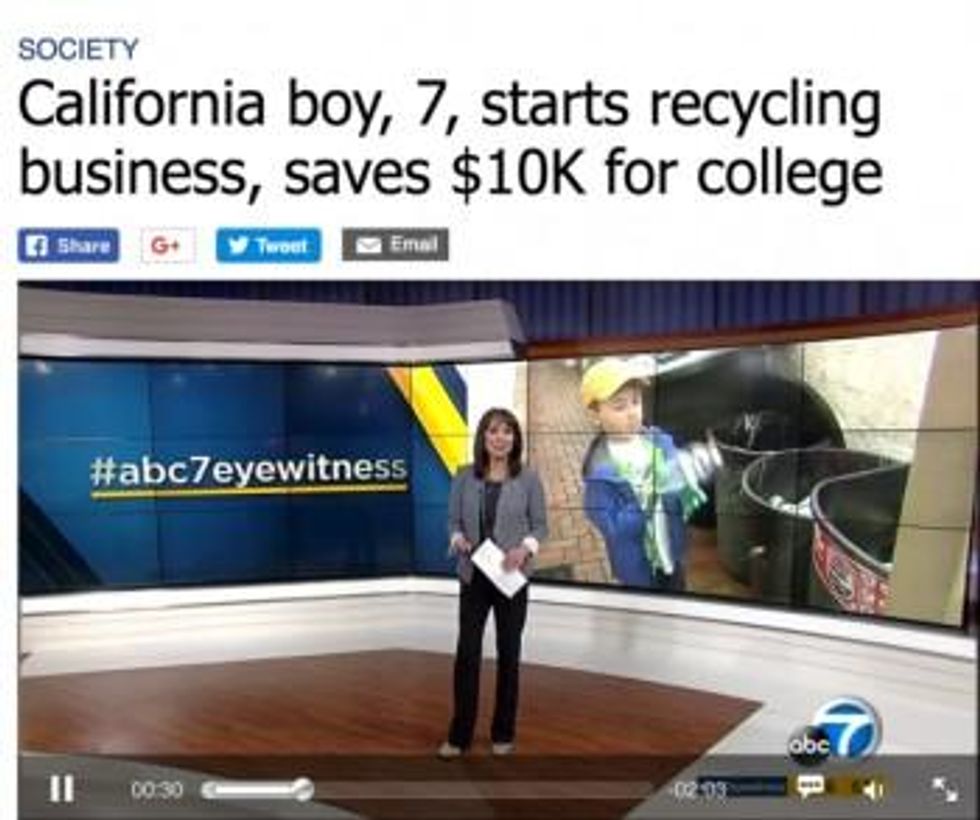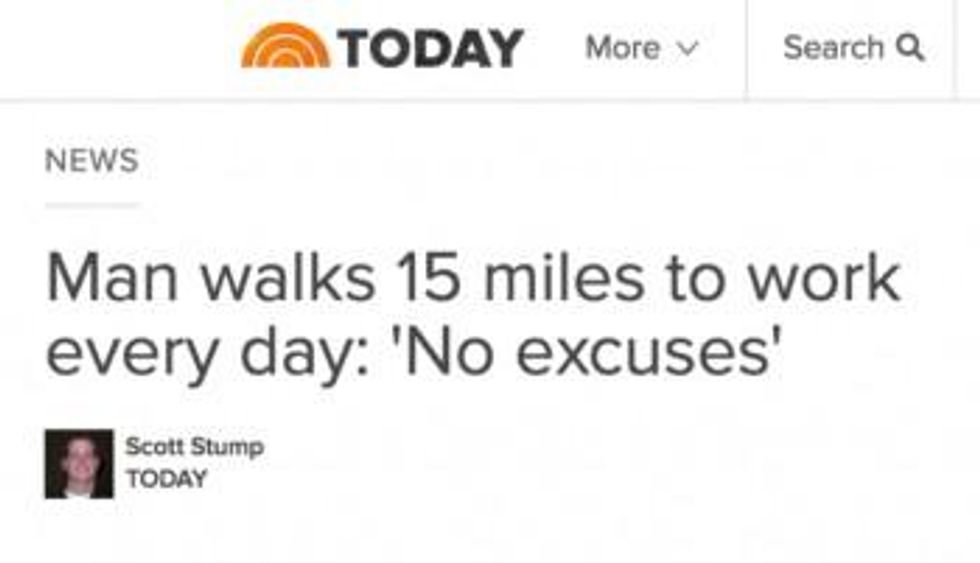

SUBSCRIBE TO OUR FREE NEWSLETTER
Daily news & progressive opinion—funded by the people, not the corporations—delivered straight to your inbox.
5
#000000
#FFFFFF
To donate by check, phone, or other method, see our More Ways to Give page.


Daily news & progressive opinion—funded by the people, not the corporations—delivered straight to your inbox.

You've seen or heard or read the personal interest story a thousand times: An enterprising seven-year-old collects cans to save for college (ABC7, 2/8/17), a man with unmatched moxie walks 15 miles to his job (Today, 2/20/17), a low-wage worker buys shoes for a kid whose mother can't afford them (Fox5,
You've seen or heard or read the personal interest story a thousand times: An enterprising seven-year-old collects cans to save for college (ABC7, 2/8/17), a man with unmatched moxie walks 15 miles to his job (Today, 2/20/17), a low-wage worker buys shoes for a kid whose mother can't afford them (Fox5, 12/14/16), an "inspiring teen" goes right back to work after being injured in a car accident (CBS News, 12/16/16). All heartwarming tales of perseverance in the face of impossible odds--and all ideological agitprop meant to obscure and decontextualize the harsh reality of dog-eat-dog capitalism.

These stories are typically shared for the purposes of poor-shaming, typically under the guise of inspirational life advice. "This man is proof we all just need to keep walking, no matter what life throws at us," insisted Denver ABC7 anchor Anne Trujillo, after sharing one of those stories of a poor person forced to walk thousands of miles a year to survive.
A healthy press would take these anecdotes of "can do" spirit and ask bigger questions, like why are these people forced into such absurd hardship? Who benefits from skyrocketing college costs? Why does the public transit in this person's city not have subsidies for the poor? Why aren't employers forced to offer time off for catastrophic accidents? But time and again, the media mindlessly tells the bootstrap human interest story, never questioning the underlying system at work.
One particularly vulgar example was CBS News (12/16/16) referring to an "inspiring" African-American kid who had to work at his fast food job with an arm sling and a neck brace after a car accident. To compound the perseverance porn, he was, at least in part, doing so to help donate to a local homeless charity. Here we have a story highlighting how society has colossally failed its most vulnerable populations--the poor, ethnic minorities, children and the homeless--and the take-home point is, "Ah gee, look at that scrappy kid."
Journalism is as much--if not more--about what isn't reported as what is. Here a local reporter is faced with a cruel example of people falling through the cracks of the richest country on Earth, and their only contribution is to cherry-pick one guy who managed--just barely--to cling on to the edge.

It's part of a broader media culture of anecdotes in lieu of the macro, moralizing "success" rather than questioning systemic problems. Perseverance porn may seem harmless, but in highlighting handpicked cases of people overcoming hardship without showing the thousands that didn't--much less asking broader questions as to what created these conditions--the media traffics in decidedly right-wing tropes. After all, if they can do it, so can you--right?
Dear Common Dreams reader, The U.S. is on a fast track to authoritarianism like nothing I've ever seen. Meanwhile, corporate news outlets are utterly capitulating to Trump, twisting their coverage to avoid drawing his ire while lining up to stuff cash in his pockets. That's why I believe that Common Dreams is doing the best and most consequential reporting that we've ever done. Our small but mighty team is a progressive reporting powerhouse, covering the news every day that the corporate media never will. Our mission has always been simple: To inform. To inspire. And to ignite change for the common good. Now here's the key piece that I want all our readers to understand: None of this would be possible without your financial support. That's not just some fundraising cliche. It's the absolute and literal truth. We don't accept corporate advertising and never will. We don't have a paywall because we don't think people should be blocked from critical news based on their ability to pay. Everything we do is funded by the donations of readers like you. Will you donate now to help power the nonprofit, independent reporting of Common Dreams? Thank you for being a vital member of our community. Together, we can keep independent journalism alive when it’s needed most. - Craig Brown, Co-founder |
You've seen or heard or read the personal interest story a thousand times: An enterprising seven-year-old collects cans to save for college (ABC7, 2/8/17), a man with unmatched moxie walks 15 miles to his job (Today, 2/20/17), a low-wage worker buys shoes for a kid whose mother can't afford them (Fox5, 12/14/16), an "inspiring teen" goes right back to work after being injured in a car accident (CBS News, 12/16/16). All heartwarming tales of perseverance in the face of impossible odds--and all ideological agitprop meant to obscure and decontextualize the harsh reality of dog-eat-dog capitalism.

These stories are typically shared for the purposes of poor-shaming, typically under the guise of inspirational life advice. "This man is proof we all just need to keep walking, no matter what life throws at us," insisted Denver ABC7 anchor Anne Trujillo, after sharing one of those stories of a poor person forced to walk thousands of miles a year to survive.
A healthy press would take these anecdotes of "can do" spirit and ask bigger questions, like why are these people forced into such absurd hardship? Who benefits from skyrocketing college costs? Why does the public transit in this person's city not have subsidies for the poor? Why aren't employers forced to offer time off for catastrophic accidents? But time and again, the media mindlessly tells the bootstrap human interest story, never questioning the underlying system at work.
One particularly vulgar example was CBS News (12/16/16) referring to an "inspiring" African-American kid who had to work at his fast food job with an arm sling and a neck brace after a car accident. To compound the perseverance porn, he was, at least in part, doing so to help donate to a local homeless charity. Here we have a story highlighting how society has colossally failed its most vulnerable populations--the poor, ethnic minorities, children and the homeless--and the take-home point is, "Ah gee, look at that scrappy kid."
Journalism is as much--if not more--about what isn't reported as what is. Here a local reporter is faced with a cruel example of people falling through the cracks of the richest country on Earth, and their only contribution is to cherry-pick one guy who managed--just barely--to cling on to the edge.

It's part of a broader media culture of anecdotes in lieu of the macro, moralizing "success" rather than questioning systemic problems. Perseverance porn may seem harmless, but in highlighting handpicked cases of people overcoming hardship without showing the thousands that didn't--much less asking broader questions as to what created these conditions--the media traffics in decidedly right-wing tropes. After all, if they can do it, so can you--right?
You've seen or heard or read the personal interest story a thousand times: An enterprising seven-year-old collects cans to save for college (ABC7, 2/8/17), a man with unmatched moxie walks 15 miles to his job (Today, 2/20/17), a low-wage worker buys shoes for a kid whose mother can't afford them (Fox5, 12/14/16), an "inspiring teen" goes right back to work after being injured in a car accident (CBS News, 12/16/16). All heartwarming tales of perseverance in the face of impossible odds--and all ideological agitprop meant to obscure and decontextualize the harsh reality of dog-eat-dog capitalism.

These stories are typically shared for the purposes of poor-shaming, typically under the guise of inspirational life advice. "This man is proof we all just need to keep walking, no matter what life throws at us," insisted Denver ABC7 anchor Anne Trujillo, after sharing one of those stories of a poor person forced to walk thousands of miles a year to survive.
A healthy press would take these anecdotes of "can do" spirit and ask bigger questions, like why are these people forced into such absurd hardship? Who benefits from skyrocketing college costs? Why does the public transit in this person's city not have subsidies for the poor? Why aren't employers forced to offer time off for catastrophic accidents? But time and again, the media mindlessly tells the bootstrap human interest story, never questioning the underlying system at work.
One particularly vulgar example was CBS News (12/16/16) referring to an "inspiring" African-American kid who had to work at his fast food job with an arm sling and a neck brace after a car accident. To compound the perseverance porn, he was, at least in part, doing so to help donate to a local homeless charity. Here we have a story highlighting how society has colossally failed its most vulnerable populations--the poor, ethnic minorities, children and the homeless--and the take-home point is, "Ah gee, look at that scrappy kid."
Journalism is as much--if not more--about what isn't reported as what is. Here a local reporter is faced with a cruel example of people falling through the cracks of the richest country on Earth, and their only contribution is to cherry-pick one guy who managed--just barely--to cling on to the edge.

It's part of a broader media culture of anecdotes in lieu of the macro, moralizing "success" rather than questioning systemic problems. Perseverance porn may seem harmless, but in highlighting handpicked cases of people overcoming hardship without showing the thousands that didn't--much less asking broader questions as to what created these conditions--the media traffics in decidedly right-wing tropes. After all, if they can do it, so can you--right?